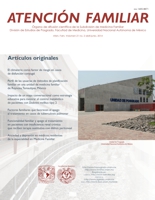Family Factors that Favor Adherence to Treatment of Pulmonary Tuberculosis Cases
Main Article Content
Abstract
Objective: identify the family factors that favor adherence to treatment of Pulmonary Tuberculosis (ptb). Material and methods: observational, descriptive, cross-sectional and prospective study made at the Family Medicine Unit (fmu) no. 33 in Reynosa, Tamaulipas, Mexico. All patients diagnosed with ptb, as first time, were included and selected through a nominal census. Results: there were identified 57 patients with ptb. A prevalence of 0.02%, with a predominance of males (56%) of the patients was determined. The minimum age was 18 years and the maximum of 83, with an average of 39±12 years, trend to 26 years and medium of 50.5 years; 85% of the patients began with a shortened treatment strictly supervised (stss), 66.6% of them cured by the end of the treatment, 19.2% continued in retreat and 12% abandoned treatment; 92.2% referred affectation in his personal life after being diagnosed of ptb. Patients with neglect treatment 75% presented some level of family dysfunction. Conclusions: prevalence of ptb at the fmu was of 0.02%, figure remarkably lower than the national average, which is 15 per 100 000 inhabitants. There were high levels of family dysfunction and social rejection in patients with abandon to the treatment than in those with a diagnosis of cure, who presented more familiar functionality.
Downloads
Download data is not yet available.
Article Details
How to Cite
Martínez-Hernández, Y. O., Guzmán-López, F., Flores-Pulido, J. J., & Vázquez-Martínez, V. H. (2015). Family Factors that Favor Adherence to Treatment of Pulmonary Tuberculosis Cases. Atención Familiar, 21(2). https://doi.org/10.22201/facmed.14058871p.2014.2.47913
